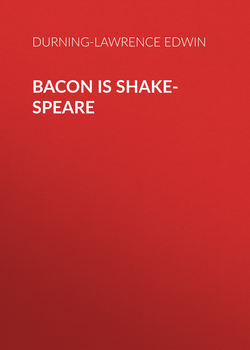Читать книгу Bacon is Shake-Speare - Durning-Lawrence Edwin - Страница 6
BACON IS SHAKESPEARE
Chapter V
Оглавление"The Return from Parnassus" and "Ratsei's Ghost."
The next play to which attention must be called is "The Return from Parnassus" which was produced at Cambridge in 1601 and was printed in 1606 with the following title page: —
The Returne from Parnassus
or
The Scourge of Simony.
Publiquely acted by the Students
in Saint Johns Colledge in
Cambridge.
At London
Printed by G. Eld for John Wright, and
are to bee sold at his shop at
Christchurch Gate.
1606.
The portion to which I wish to direct attention is: —
Actus 5, Scena i.
Studioso. Fayre fell good Orpheus, that would rather be
King of a mole hill, then a Keysars slaue:
Better it is mongst fidlers to be chiefe,
Then at plaiers trencher beg reliefe.
But ist not strange this mimick apes should prize
Vnhappy Schollers at a hireling rate.
Vile world, that lifts them vp to hye degree,
And treades vs downe in groueling misery.
England affordes those glorious vagabonds,
That carried earst their fardels on their backes,
Coursers to ride on through the gazing streetes
Sooping it in their glaring Satten sutes,
And Pages to attend their maisterships:
With mouthing words that better wits haue framed,
They purchase lands, and now Esquiers are made.
Philomusus. What ere they seeme being euen at the best
They are but sporting fortunes scornfull iests.
Can these last two lines refer to Shakspeare the actor seeming to be the poet? Note that they are spoken by Philomusus that is friend of the poetic muse. Mark also the words "this mimick apes." Notice especially "with mouthing words that better wits haue framed, they purchase lands and now Esquiers are made" i.e. get grants of arms. Who at this period among mimics excepting W. Shakspeare of Stratford purchased lands and obtained also a grant of arms?
That this sneer "mouthing words that better wits have framed" must have been aimed at Shakspeare is strongly confirmed by the tract (reprinted by Halliwell-Phillipps in his "Outlines of Shakespeare," 1889, Vol. I, p. 325) which is called "Ratsei's Ghost or the second part of his mad prankes and Robberies."
This pamphlet bears no date, but was entered at Stationers' Hall May 31st 1605. There is only a single copy in existence, which used to be in Earl Spencer's library at Althorp but is now in the Rylands; Library at Manchester. As I said, it is reprinted by Halliwell-Phillipps, and Stratfordians are obliged to agree with him that the reference is unquestionably to "Wm Shakespeare of Stratford." The most important part which is spoken by Ratsei the robber to a country player is as follows: —
Ratsei. And for you sirra, saies hee to the chiefest of them, thou hast a good presence upon a stage; methinks thou darkenst thy merite by playing in the country. Get thee to London, for if one man were dead, they will have much neede of such a one as thou art. There would be none in my opinion fitter then thyselfe to play his parts. My conceipt is such of thee, that I durst venture all the mony in my purse on thy head to play Hamlet with him for a wager. There thou shalt learn to be frugall, – for players were never so thriftie as they are now about London – and to feed upon all men, to let none feede upon thee; to make thy hand a stranger to thy pocket, thy hart slow to performe thy tongues promise, and when thou feelest thy purse well lined, buy thee some place of lordship in the country, that, growing weary of playing, thy mony may there bring thee to dignitie and reputation; then thou needest care for no man, nor not for them that before made thee prowd with speaking their words upon the stage.
The whole account of buying a place in the country, of feeding upon all men (that is lending money upon usury) of never keeping promises, of never giving anything in charity, agrees but too well with the few records we possess of the man of Stratford. And therefore Stratfordians are obliged to accept Halliwell-Phillipps' dictum that this tract called Ratsei's Ghost refers to the actor of Stratford and that "he needed not to care for them that before made him proud with speaking their words upon the stage." How is it possible that Stratfordians can continue to refuse to admit that the statement in the "Return from Pernassus" "with mouthing words that better wits haue framed they purchase lands and now Esquiers are made" must also refer to the Stratford Actor?
